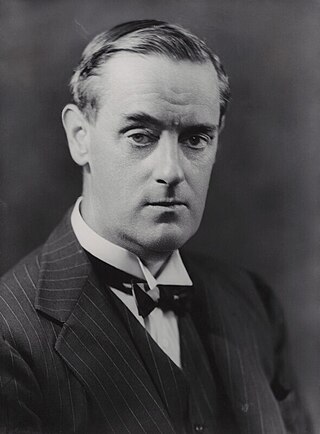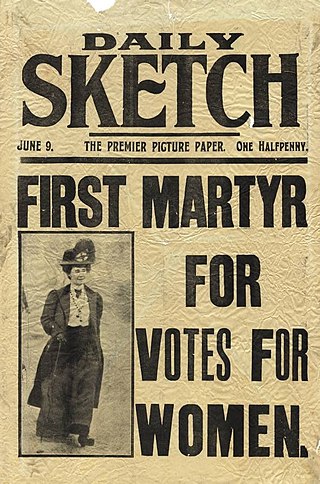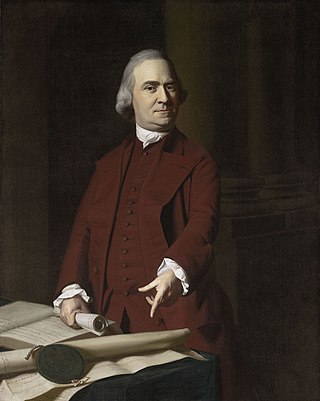
King George's War (1744–1748) is the name given to the military operations in North America that formed part of the War of the Austrian Succession (1740–1748). It was the third of the four French and Indian Wars. It took place primarily in the British provinces of New York, Massachusetts Bay, New Hampshire, and Nova Scotia. Its most significant action was an expedition organized by Massachusetts Governor William Shirley that besieged and ultimately captured the French fortress of Louisbourg, on Cape Breton Island in Nova Scotia, in 1745. In French, it is known as the Troisième Guerre Intercoloniale or Third Intercolonial War.

Johann von Robais, Baron de Kalb, born Johann Kalb, was a Franconian-born French military officer who served as a major general in the Continental Army during the American Revolutionary War. He was mortally wounded while fighting against the British Army during the Battle of Camden.

Charles Francis Adams Sr. was an American historical editor, writer, politician, and diplomat. As United States Minister to the United Kingdom during the American Civil War, Adams was crucial to Union efforts to prevent British recognition of the Confederate States of America and maintain European neutrality to the utmost extent. Adams also featured in national and state politics before and after the Civil War.

The Sons of Liberty was a loosely organized, clandestine, sometimes violent, political organization active in the Thirteen American Colonies founded to advance the rights of the colonists and to fight taxation by the British government. It played a major role in most colonies in battling the Stamp Act in 1765 and throughout the entire period of the American Revolution.

Victor Alexander John Hope, 2nd Marquess of Linlithgow, was a British Unionist politician, agriculturalist, and colonial administrator. He served as Governor-General and Viceroy of India from 1936 to 1943. He was usually referred to simply as Linlithgow.

The Daily Sketch was a British national tabloid newspaper, founded in Manchester in 1909 by Sir Edward Hulton, 1st Baronet.

Patriots were colonists in the Thirteen Colonies who opposed the Kingdom of Great Britain's control over the colonies during the American Revolution. Patriot politicians led colonial opposition to British policies regarding the American colonies, eventually adopting the United States Declaration of Independence on July 4, 1776. After the American Revolutionary War broke out in 1776, Patriots fought a victorious conflict against the British and their allies, which saw the colonies gain their independence as the United States in 1783.

The Boston Tea Party was an American political and mercantile protest on December 16, 1773, by the Sons of Liberty in Boston in colonial Massachusetts. The target was the Tea Act of May 10, 1773, which allowed the British East India Company to sell tea from China in American colonies without paying taxes apart from those imposed by the Townshend Acts. The Sons of Liberty strongly opposed the taxes in the Townshend Act as a violation of their rights. In response, the Sons of Liberty, some disguised as Native Americans, destroyed an entire shipment of tea sent by the East India Company.

Sir Hugh Eyre Campbell Beaver, KBE was an English-South African civil engineer, industrialist and bureaucrat, who founded the Guinness World Records. He was Director-General of the Ministry of Works and managing director at Guinness Brewery.

Richard George Adams was an English novelist and writer of the books Watership Down, Maia, Shardik and The Plague Dogs. He studied modern history at university before serving in the British Army during World War II. Afterwards, he completed his studies, and then joined the British Civil Service. In 1974, two years after Watership Down was published, Adams became a full-time author.
The Colonial Service, also known as His/Her Majesty's Colonial Service and replaced in 1954 by Her Majesty's Overseas Civil Service (HMOCS), was the British government service that administered most of Britain's overseas possessions, under the authority of the Secretary of State for the Colonies and the Colonial Office in London. It did not operate in British India, where the same function was delivered by the Indian Civil Service, nor in the Anglo-Egyptian Sudan, which was administered by the Sudan Political Service, nor in the internally self-governing colony of Southern Rhodesia.

Samuel Adams was an American statesman, political philosopher, and a Founding Father of the United States. He was a politician in colonial Massachusetts, a leader of the movement that became the American Revolution, a signer of the Declaration of Independence and other founding documents, and one of the architects of the principles of American republicanism that shaped the political culture of the United States. He was a second cousin to his fellow Founding Father, President John Adams.
The Diocese of Cariboo was a diocese of the Ecclesiastical Province of British Columbia and the Yukon of the Anglican Church of Canada. Incorporated in 1914, the diocese ceased operations on December 31, 2001 when the financial strain of legal costs from third party claims made by the Government of Canada, associated with damage suits brought by former students of the Anglican-run St George's Indian Residential School in Lytton, B.C., exhausted the diocese financially.

Sir John Stuart Macpherson, GCMG was a British colonial administrator who served as the governor of Nigeria from 1948 to 1954, and as governor-general from 1954 to 1955.
Edmund Bults, better known by his alias Edmund Edgar, was an English-born painter, engraver and lithographer who was transported as a convict to the British penal colony of New South Wales.
Sir Arthur Hilton Poynton GCMG, known as Sir Hilton Poynton, was a British civil servant who held the position of Permanent Under-Secretary of State for the Colonies from 1959 until his retirement in 1966.
Sir Arthur Charles Cosmo Parkinson GCMG KCB OBE, known as Sir Cosmo Parkinson, was a British civil servant who held the position of Permanent Under-Secretary of State for the Colonies from 1937 to 1940 and from 1940 to 1942.
Sir Thomas Ingram Kynaston Lloyd GCMG KCB, was a British civil servant who held the position of Permanent Under-Secretary of State for the Colonies from 1947 to 1956.
Sir John Humphrey Wise, KCMG, CBE was a British colonial administrator. A member of the Indian Civil Service, he spent almost his entire career in British Burma, where he held key positions.












